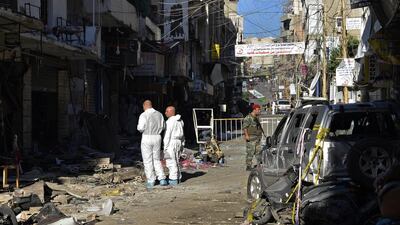What do the recent attacks in Paris and Beirut tell us about our enemies, and how to defeat them?
Burj Al Barajneh is a small southern Beirut suburb unknown to much of the international community before the recent ISIL terrorist attacks, which claimed the lives of 43 innocent people and maimed 200 others.
After the horrific attacks, it still remains mostly unheard of. A tragedy that wasn’t, at least in some parts of the world.
Ayman Hussein, a Burj Al Barajneh resident and member of the Shiite majority community, is puffing on his third cigarette when I speak to him.
His eyes dart in all directions, suggesting the vigilance of a man who's seen far too many conflicts. He tells me that “for as long as the international community ignores our struggle, and doesn’t give us the support we need to fight Daesh, they will attack us again, and probably Europe again too”.
Little more than a day after Mr Hussein’s grim prognosis, Paris was attacked by armed zealots, culminating in the massacre of over 120 people, with 300 injured.
The attacks in Beirut and Paris were both committed by the same abhorrence that calls itself ISIL, and unfortunately, for now, it walks with earthly feet.
What these attacks show us is that such madmen care not whether one is European or Arab, Christian or Muslim, their message is universal: capitulate to us, whoever you are or be killed.
What Mr Hussein said relates to a truth that so far many columnists and pundits are unwilling to acknowledge, that events “there” and “here” are interconnected: that Arabs and Muslims are victims of the same tormentors as well, and often to a much greater degree.
“There”, of course, is the place that many see as the land of endemic violence and religious fanaticism: Syria, Iraq and the Middle East in general.
“Here” is the West, a circumscribed geographic area of law, order and stability. The problem is that such a binary vision of the world leads us to assume that “their” problems are not “ours” and that terrorism is a feature of life over there, not here.
Such ignorance is bliss, until we are convulsed out of our collective stupor by the spilling of our own blood on our home soil (which is when terrorist attacks conveniently become global tragedies). Such events serve to remind us that the space between “there” and “here” isn’t quite so vast after all.
The terrorist attacks in Paris were not a set of isolated events of local origin. They were not random and disconnected from world events. The attacks in Paris were a side story of events in places like Syria. Parisians were victims of the same violence that the people of countries like Lebanon have been stalked by for years.
Unfortunately, however, some pundits and politicians in the West are only tumultuous when attacks happen on European and US soil. Beirut’s pain remains muted in comparison.
The lack of media attention simply perpetuates public indifference or ignorance in the West towards “their” suffering. Furthermore, the war on terror narrative, which frames attacks such as the one in France as an attack on shared “western liberal values”, mutes the voices of those that are not from Western societies – such as Beirut – despite being victims of the same terrorists.
On a strategic level, the media’s lack of coverage will not make problems disappear. The inability or unwillingness to see the interconnectedness of events means that we risk remaining strategically blind, almost certainly guaranteeing future attacks.
On the other hand, a heightened awareness regarding, for example, the Beirut bombings, may be a prerequisite for a realisation that ISIL are a common enemy that must be faced together.
When it becomes common knowledge that, for example, eight times as many Muslims are killed by Al Qaeda-inspired groups than non-Muslims, the fact that our war on terror is part of theirs should become starkly apparent.
For this to succeed, it is important that the people of the region are humanised in the West, rather than consigned to the status of ghosts, with no stories of lived experiences to tell.
As we know by now, ISIL relies on divisions between the Muslim and non-Muslim world to stabilise its narrative that the Judaeo-Christian West and the Muslim world are irreconcilable. Thus, ISIL actually relies on Western indifference to the grieving families of last week’s victims in Beirut. We must not let them have such a victory.
A few days later, I find Mr Hussein once more. He lights another cigarette, naturally, and asserts that the people of Burj Al Barajneh were saddened by the news in Paris. He adds that he's praying for the victims’ families.
He says that he does not expect many in Paris or elsewhere in Europe to be aware of what happened in Beirut last Thursday.
Yet, despite that, he declares, with a tone of optimism, that “Daesh is an enemy that the entire world must face together”.
Matthew Ayton is a freelance writer and researcher who is currently in Beirut

